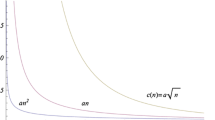Abstract
Dietrich and List (Int J Game Theory 1–25, 2012) enrich the standard model of choice by explicitly modeling a decision maker’s mental state. They assume that a change in mental state either induces a change in preferences, or alternatively, a change in the decision maker’s perception of the choice problem. This paper argues that the two interpretations are not always interchangeable. Presented are two examples which demonstrate that decision maker’s (“subjective”) perception may not be adequately modeled as embodied in his preferences over (“objective”) alternatives. It is also emphasized that in order to understand choice behavior, one has to take into the account decision maker’s perception of the choice problem rather than its “objective” description by an observer.


Similar content being viewed by others
Notes
See however Dietrich and List (2013b), where the difference between the two interpretations is more emphasized.
Strictly speaking, “objective” description of alternatives is not feasible, hence the parentheses. The thesis, first emphasized by Popper (2002), that all perception is theory-laden seems now generally accepted (see especially recent literature on predictive coding, e.g. Mumford 1992; Rao and Ballard 1999; Friston 2005, 2012; Clark 2013), although there may be different senses in which theories affect perception (Khalil 2013). From this perspective “objective” description stands for “observer’s” description which may, but need not, correspond to decision maker’s perception.
An example of such a dependence can be illustrated by the following observation by Katz (1937, 143) made with reference to animal perception: “A hungry animal divides the environment into edible and inedible things. An animal in flight sees roads to escape and hiding places [...] Generally speaking, objects change [...] according to the needs of the animal.” Similarly, Hardy and Heyes (1999, 24) claim that hungry people are more likely to notice food thus suggesting that mental states and perception are closely connected. Empirical evidence on the relationship between perception and motivation can be found in e.g. Balcetis and Dunning (2006) and Veltkamp et al. (2008).
References
Adler JE (1984) Abstraction is uncooperative. J Theory Soc Behav 14(2):165–181
Adler JE (1991) An optimist’s pessimism: conversation and conjunction. Poznan Stud Philos Sci Humanit 21:251–282
Bacharach M (2006) Beyond individual choice: teams and frames in game theory. In: Gold N, Sugden R (eds) Princeton University Press, Princeton
Balcetis E, Dunning D (2006) See what you want to see: motivational influences on visual perception. J Pers Soc Psychol 91(4):612–625
Berkeley D, Humphreys P (1982) Structuring decision problems and the ‘bias heuristic’. Acta Psychol 50(3):201–252
Bicchieri C (2005) The grammar of society: the nature and dynamics of social norms. Cambridge University Press, Cambridge
Birnbaum MH (1983) Base rates in Bayesian inference: signal detection analysis of the cab problem. Am J Psychol 96(1):85–94
Clark A (2013) Whatever next? Predictive brains, situated agents, and the future of cognitive science. Behav Brain Sci 36(03):181–204
Cohen LJ (1981) Can human irrationality be experimentally demonstrated? Behav Brain Sci 4(03):317–331
Dietrich F, List C (2012) Where do preferences come from?. Int J Game Theory, pp 1–25
Dietrich F, List C (2013a) A reason-based theory of rational choice. Noûs 47(1):104–134
Dietrich F, List C (2013b) Reason-based rationalization. MPRA Paper. University Library of Munich, Germany
Friston K (2005) A theory of cortical responses. Philos Trans R Soc B: Biol Sci 360(1456):815–836
Friston K (2012) Prediction, perception and agency. Int J Psychophysiol 83(2):248–252
Griffin DW, Ross L (1991) Subjective construal, social inference, and human misunderstanding. In: Zanna MP (ed) Advances in experimental social psychology, vol. 24. Academic Press, San Diego, pp 319–59
Hardy M, Heyes S (1999) Beginning psychology. Oxford University Press, Oxford
Hayek FA (1943) The facts of the social sciences. Ethics 54(1):1–13
Hayek FA (1952) The counter-revolution of science. The Free Press, Glencoe
Hilton DJ (1995) The social context of reasoning: conversational inference and rational judgment. Psychol Bull 118(2):248–271
Hudík M (2011) A note on Nozick’s problem. Q J Austrian Econ 14(2):256–260
Katz D (1937) Animals and men: studies in comparative psychology. Longmans, Green, London
Khalil EL (2013) Two kinds of theory-laden cognitive processes: distinguishing intransigence from dogmatism. Behav Brain Sci 36(03):218–219
Klein DB (2012) Knowledge and coordination: a liberal interpretation. Oxford University Press, Oxford
Lopes LL (1981) Performing competently. Behav Brain Sci 4(03):343–344
McKenzie CRM (2003) Rational models as theories—not standards—of behavior. Trends Cogn Sci 7(9):403–406
Messer WS, Griggs RA (1993) Another look at Linda. Bull Psychon Soc 31(3):193–196
Mumford D (1992) On the computational architecture of the neocortex. Biol Cybern 66(3):241–251
Popper KR (2002) The logic of scientific discovery. Routledge, London
Rao RPN, Ballard DH (1999) Predictive coding in the visual cortex: a functional interpretation of some extra-classical receptive-field effects. Nat Neurosci 2(1):79–87
Rubinstein A (1991) Comments on the interpretation of game theory. Econometrica 59(4):909–924
Schwarz N (1996) Cognition and communication: judgmental biases, research methods, and the logic of conversation. Lawrence Erlbaum Associates, Mahwah
Searle JR (1997) The construction of social reality. Free Press, New York
Searle JR (2005) What Is an Institution? J Inst Econ 1(1):1–22
Stanovich KE, West RF (2000) Individual differences in reasoning: implications for the rationality debate? Behav Brain Sci 23(5):645–665; discussion 665–726
Veltkamp M, Aarts H, Custers R (2008) Perception in the service of goal pursuit: motivation to attain goals enhances the perceived size of goal-instrumental objects. Soc Cogn 26(6):720–736
von Mises L (1996) Human action: a treatise on economics, 4th revised. Fox & Wilkes, San Francisco
Weber M (1949a) Objectivity in social science and social policy. In: Shils EA, Finch HA (eds) The methodology of the social sciences, pp 50–112. Glencoe: Free Press
Weber M (1949b) The meaning of ‘ethical neutrality’ in sociology and economics. In: Shils EA, Finch HA (eds) The methodology of the social sciences, pp 1–47. Glencoe: Free Press
Author information
Authors and Affiliations
Corresponding author
Rights and permissions
About this article
Cite this article
Hudík, M. A preference change or a perception change? A comment on Dietrich and List. Int J Game Theory 44, 425–431 (2015). https://doi.org/10.1007/s00182-014-0436-8
Accepted:
Published:
Issue Date:
DOI: https://doi.org/10.1007/s00182-014-0436-8




